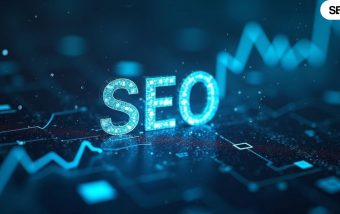Guest Posting Isn’t Dead — But Google’s Standards Have Evolved
Jun 26, 2025

Jun 26, 2025

Jun 23, 2025

Jun 23, 2025

Jun 22, 2025

Jun 20, 2025

Jun 20, 2025

Jun 19, 2025

Jun 18, 2025
Sorry, but nothing matched your search "". Please try again with some different keywords.


Did you know that 68% of online experiences begin with a search engine?
If you are an eCommerce owner, one of the most important things you can do for your website is optimize it for search engines. Specifically, you should focus on both page
and off-page SEO to help your site reach the first search engine results page.
But what are on-page and off-page SEO, and how do they differ? Keep reading to learn more!
On-page SEO and off-page SEO are two important factors to consider when optimizing your website for search engine visibility. On-page SEO consists of the following:
A successful SEO strategy ultimately accounts for both on-page and off-page SEO techniques to maximize visibility and success. On-page SEO optimizes the code of the website page itself by making it as search-engine-friendly as possible. This includes HTML tags, meta tags, clean coding practices, keyword optimization, and more.
This helps web crawlers understand the page’s relevancy to a search query. Content is an essential part of on and off-page optimization.
Web content needs to be optimized with targeted keywords and Phrases. The more optimized content, the better the chances search engines will index a web page. This be promoted and shared to get noticed.
Page titles should give an overview of the page content and accurately match the content the user will find. Page titles are also essential for off-page SEO. They link through to the content on the page and allow search engine robots to crawl the content and understand its content.
Off-page SEO includes activities away from your website, such as:

Link building is related to organic search engine marketing and attracts attention from other relevant sources to a website. Link building can be done in various ways, such as submitting promotional content, asking for reviews, participating in Q&A forums, or through social media promotion.
Having an active presence on social media helps to build a community of followers. This is usually done by forming relationships with other websites and promoting content on social media platforms. It plays a vital role in both on and off-page SEO.
Social media engagement can be used in creating content. It can increase website authority and improve a website’s SEO ranking.
Good online reviews are an essential off-page SEO tactic, as many rely on user reviews when making decisions. The high volume of ratings, positive user sentiment, and ratings will help to boost the website’s position when people search for terms related to the product or service.
It is essential to understand the distinction between on-page and off-page SEO. On-page SEO refers to optimizing the content on the website itself. Off-page SEO refers to the optimization of content external to the website.
Binary Informatics and its SEO professional can optimize both on-page and off-page SEO. It ensures that the website is seen by users and adequately indexed.
It increases the chance of users clicking through to the website for further information. Both tactics are essential to an SEO strategy. It should be combined to get the maximum benefit.
The benefits of on-page SEO are that it boosts the website’s ranking in SERPs, increases website visibility, and establishes trust among search engine users. With off-page SEO, websites benefit from greater brand awareness, increased organic traffic, and better customer engagement.
Another main benefit of On-page and Off-Page SEO is that it increases the authority of websites as rated by the various search engine algorithms. This further increases the chances of ranking higher in SERPs and getting more organic traffic.
It is essential to ensure SEO implementation is strategic and consistent to avoid damaging your website’s ranking. When done correctly, SEO can be an effective tool to help improve your website’s visibility and credibility.
Common mistakes to avoid when implementing SEO include the following:

It is also essential to use appropriate keyword stuffing to increase page ranking. Keyword stuffing is a method of inserting excessive keywords into the content to appear more frequently in search engine results. This practice can result in penalization of the website by search engines.
All of these elements are important for achieving higher search engine rankings. Off-page SEO can be even more important than on-page SEO, depending on the targeted keywords. Certain activities, like link-building, can have a tremendous impact on the success of the website.
Not using descriptive titles is an example of one of the biggest mistakes in on-page SEO. For search engine crawlers to accurately identify the contents of a page. It is essential to use descriptive titles that are specific to the content,f
Without descriptive titles, search engine crawlers may be unable to understand the content. The page may not be able to rank as well as it would if it had an optimized title.
Internal links are often overlooked despite their significance in website navigation. Internal links facilitate navigation and significantly distribute website authority from one page to another by passing on link juice. Not thoroughly optimizing internal links is an example of a shortcoming with on-page SEO.
This can be the difference between a page ranking at the top or bottom of a search engine result page. Properly optimizing internal links can ensure that the correct pages get the most link juice and thus rank higher in the search engine results.
Implementing on-page and off-page optimization strategies is essential for the best results. Proper search engine optimization involves optimizing for both on-page and off-page factors.
Neglecting off-page optimization may result in your website failing to attract links or aiming for higher rankings in specific searches, potentially resulting in lost revenue.
If you are having difficulties on your site, you must hire SEO services. This agency will help you to keep your website safe and running effectively.
To summarize, understanding the differences between on-page and off-page SEO helps marketers create strategies that will go a long way toward boosting a website’s ranking. It is essential to know that both are equally important for SEO success.
To get the most out of your SEO efforts, consider taking a comprehensive approach that includes both on-page and off page SEO. Start optimizing today and watch your website climb the search engine rankings!
If you enjoy this article, check out our blog for more exciting content!
Read Also:
Abdul Aziz Mondol is a professional blogger who is having a colossal interest in writing blogs and other jones of calligraphies. In terms of his professional commitments, he loves to share content related to business, finance, technology, and the gaming niche.
View all Posts
Guest Posting Isn’t Dead — But Google’s...
Jun 26, 2025
Is Drupal the right CMS for your B2B website?...
Jun 23, 2025
How To Get Yellow Heart Snapchat Emojis? A Co...
Jun 23, 2025
150+ Video Submission Sites To Work With In 2...
Jun 22, 2025
What Are The Best Shopify Alternatives In 202...
Jun 20, 2025

